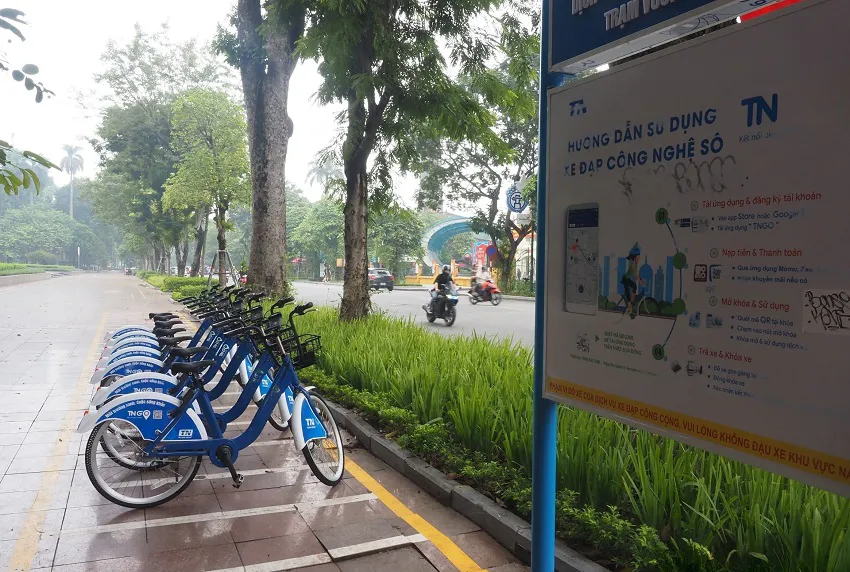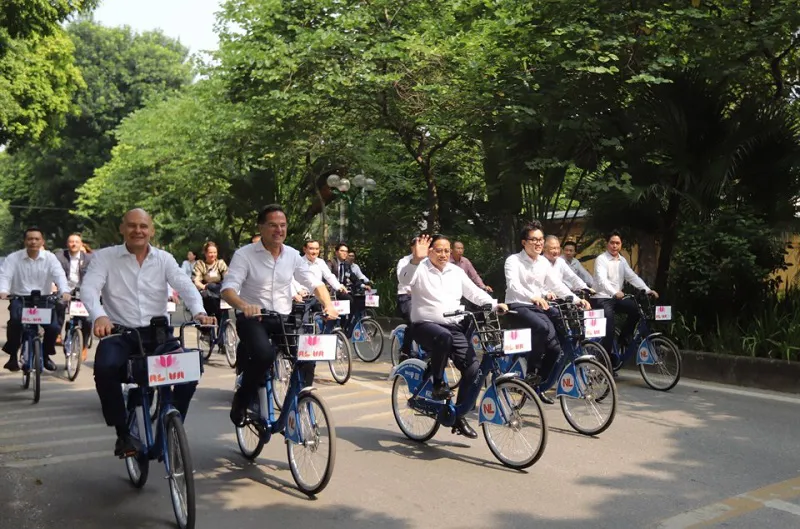Hanoi's public bike-sharing service in high demand
Locals and tourists have warmly welcomed the model as it helps diversify public transport, limit the number of private vehicles, and cut emissions.
After more than two months, Hanoi's public bike-sharing service has catered to 100,000 users, making 135,000 trips totaling 840,000 kilometers, according to Do Ba Dan, Chairman of Tri Nam Group JSC, the project's investor.
Tri Nam Group launched the service after receiving approval from the city's Department of Transportation on August 24, with 1,000 bikes, including 500 electric bikes, at 79 stations spaced one kilometer apart near tourist sites and bus stations along the Cat Linh-Ha Dong metro line.
A regular user, Ho Hong Hai (resident of Nam Tu Liem District) said he has completely switched from driving his private motorcycle to using the bike-sharing service. "Every weekend, I take my children to the Old Quarter downtown, and public bikes are the best choice, especially for children to be more physically active," Hai told The Hanoi Times.
Bicycle-sharing services are available at some public places and tourist attractions in Hanoi. Photo: Huy Pham/The Hanoi Times |
"Using a bicycle is easier to get around than a motorbike or car and improves your health. Renting a bicycle for a whole day costs only VND60,000 (US$2.4), which is the same as one taxi ride. By using the bike, I can save the cost of traveling from my home to the Old Quarter, and it is an interesting experience for my children to watch the world go by while they pedal," Hai added.
Nguyen Thi My Trang, who lives in Dong Da District and does a lot of computer work every day, said both her home and workplace are about a five-minute walk from a bike rack, so it is convenient for her to use the service.
"For an office worker like me, cycling is a form of exercise that helps relax the mind after a stressful working day. Cycling is also environmentally friendly, as dust from cars and motorbikes pollutes our lives. I think more bike-sharing services should be available at stations near tourist spots, as it is suitable for short distances and is the choice of office workers, students, and tourists," Trang told The Hanoi Times.
The service's founder, Do Ba Dan, noted that although Hanoi launched the service after Ho Chi Minh City and Danang, the number of users in the capital now accounts for more than half of the total. "The number of bikes in Hanoi is below the actual demand, but we're planning to add more bikes," he said.
"In the second phase of the project (expected from 2024), the service would be expanded to other districts, with around 3,000 bikes available at 350 bike racks located near transport hubs, schools, tourist attractions, and other public areas, making it convenient for residents and tourists," Dan added.
Vietnamese Prime Minister Pham Minh Chinh and his Dutch counterpart Mark Rutte ride bicycles on the streets of Hanoi. Photo: Khanh Huy/The Hanoi Times |
The service is most in demand from 6:00-9:00 am and 5:30-9:30 pm, and many use it on routes connecting the Cat Linh-Ha Dong metro line, the only operational metro in Vietnam.
The bikes are equipped with smart locks, GPS and Bluetooth, and the rental cost is VND5,000 ($0.21) for 30 minutes for regular bikes and VND10,000 ($0.42) for electric bikes, with full-day rentals costing VND60,000 ($2.4) and VND120,000 ($4.8). Commuters can download and install the free TNGo app on their smartphones, pay a small escrow fee to rent a bike, and return the vehicle at any station.
Phan Truong Thanh, a transportation expert, told The Hanoi Times that the policy of developing a public bike-sharing service is reasonable and timely as public transportation in Hanoi is becoming more popular.
"At present, buses in the capital have been improved and the metro line has been put into operation, serving a large number of passengers. People are also more aware that bicycles are a reasonable and convenient means of transportation when they want to reach bus stops or metro stations. Bicycles are non-polluting, well-connected, and even a tool for exercising and improving their health," Thanh said.
"After a year of testing, we found that bike rentals provide locals with another public transportation option and help them change their travel habits to protect the environment.
The model, which helps diversify public transport, limit the number of private vehicles, reduce traffic congestion, and cut emissions, has been warmly welcomed by locals and tourists," Do Viet Hai, Deputy Director of Hanoi's Department of Transport, told The Hanoi Times.













